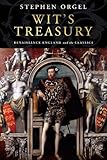Wit's Treasury : Renaissance England and the Classics / Stephen Orgel.
Material type: TextPublisher: Philadelphia : University of Pennsylvania Press, [2021]Copyright date: ©2021Description: 1 online resource (216 p.) : 44 bw halftonesContent type:
TextPublisher: Philadelphia : University of Pennsylvania Press, [2021]Copyright date: ©2021Description: 1 online resource (216 p.) : 44 bw halftonesContent type: - 9780812299878
- Classical literature -- Appreciation -- England
- Classicism -- England
- English literature -- Classical influences
- English literature -- Early modern, 1500-1700 -- History and criticism
- Renaissance -- England
- LITERARY CRITICISM / Renaissance
- Ben Jonson
- Blank verse
- Christopher Marlowe
- Classical translation
- Classicism
- Edmund Spenser
- Elizabethan drama
- English classicists
- Renaissance England
- Renaissance Humanism
- William Shakespeare
- 820.9 23
- PR428.C6
- online - DeGruyter
| Item type | Current library | Call number | URL | Status | Notes | Barcode | |
|---|---|---|---|---|---|---|---|
 eBook
eBook
|
Biblioteca "Angelicum" Pont. Univ. S.Tommaso d'Aquino Nuvola online | online - DeGruyter (Browse shelf(Opens below)) | Online access | Not for loan (Accesso limitato) | Accesso per gli utenti autorizzati / Access for authorized users | (dgr)9780812299878 |
Frontmatter -- Contents -- List of Illustrations -- Acknowledgments -- A Note on Quotations -- Chapter 1. Classicizing England -- Chapter 2. The Uses of Prosody -- Chapter 3. The Sound of Classical -- Chapter 4. What Classical Looks Like -- Chapter 5. From Black Letter to Roman -- Chapter 6. Staging the Classical -- Chapter 7. Looking Backward -- Coda -- Notes -- Bibliography -- Index
restricted access online access with authorization star
http://purl.org/coar/access_right/c_16ec
As England entered the Renaissance and as humanism, with its focus on classical literature and philosophy, informed the educational system, English intellectuals engaged in a concerted effort to remake the culture, language, manners—indeed, the whole national style—through adapting the classics. But how could English literature, art, and culture, become "classical," not only in imitating the ancients, but in the sense subsequently applied to music: "classical" as opposed to popular, as formal, serious, and therefore as good?For several decades in the sixteenth and early seventeenth centuries, Stephen Orgel writes, the return to the classics held out the promise of refinement and civility. Poetry was to be modeled on Greek and Roman examples rather than on the great English medieval works, which though admirable, lacked "correctness." More than poetry was at stake, however, and the transition would not be easy. Classical rules seemed the wave of the future, rescuing England from what was seen as the crudeness and the sheer popularity of its native traditions, but advocacy was tempered with a good deal of ambivalence: classical manners and morals were often at variance with Christian principles, and the classicism of the age would need to be deeply revisionist. "Christian humanism" was never untroubled, Orgel writes, always an unstable or even paradoxical amalgam.In Wit's Treasury, one of our foremost interpreters of Renaissance literature and culture charts how this ambivalence yielded the rich creative tension out of which emerged an unprecedented flowering of drama, lyric, and the arts. Orgel has here written a book that will appeal to anyone interested in English Renaissance art and literature, and particularly in the cultural ferment that produced Shakespeare, Marlowe, Spenser, Jonson, and Milton.
Mode of access: Internet via World Wide Web.
In English.
Description based on online resource; title from PDF title page (publisher's Web site, viewed 25. Jun 2024)


